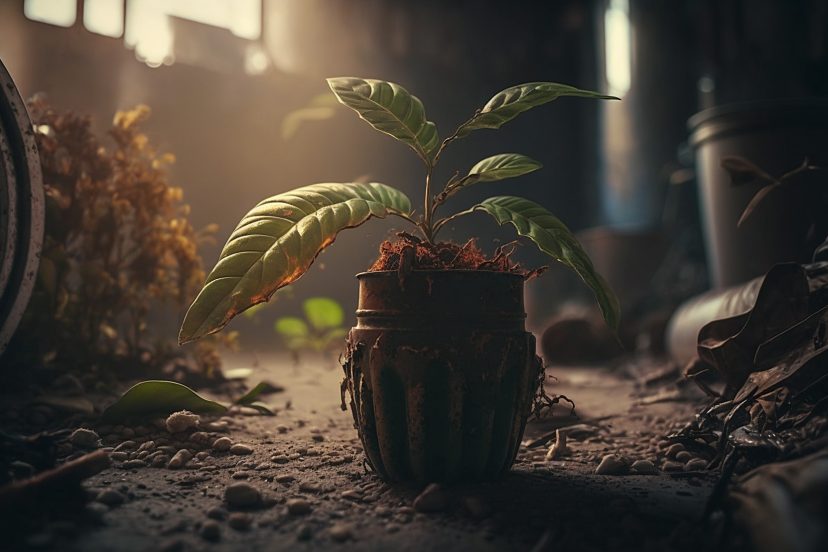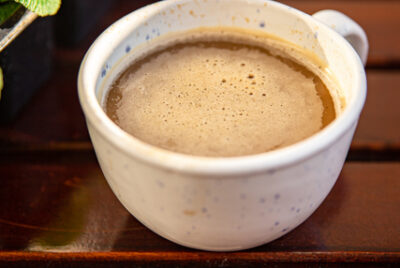What Plants Like Coffee Grounds? How to Brew Green Gardens
Hello fellow coffee lovers and green thumbs! As a coffee aficionado and plant enthusiast, I’ve discovered a unique intersection of interests: using coffee grounds in the garden. The real question though: “What plants like coffee grounds?”. After all, some plants do, some plants don’t.
The journey that led me here was filled with interesting experiments and valuable learning experiences. Let me share it with you.
My Journey with Coffee Grounds and Plants
As an avid coffee drinker and plant enthusiast, I found myself faced with two dilemmas: a burgeoning pile of used coffee grounds and a garden that was yearning for a nutrient boost. That’s when I stumbled upon a fantastic solution that allowed me to address both these issues—using coffee grounds as plant fertilizer
Discovering Coffee Grounds for Plants
The idea of using coffee grounds for plants didn’t cross my mind until a chance conversation with a barista friend of mine. He mentioned how the café often had bags of used coffee grounds available for customers to take home for their gardens. Intrigued, I started researching the benefits of coffee grounds for plants.
My fascination grew as I discovered that coffee grounds are packed with essential nutrients that are beneficial for plants. And with my daily coffee-drinking habit, I had a nearly unlimited supply. Thus began my journey of recycling coffee grounds into something meaningful for my garden.
The First Experiment
Filled with newfound knowledge and an abundance of enthusiasm, I began experimenting. Armed with coffee grounds from my daily brews, I selected my rose bushes as the first beneficiaries. I sprinkled a thin layer of coffee grounds at the base of each bush and gently worked it into the topsoil.
Over the next few weeks, I observed the changes with bated breath. And I wasn’t disappointed. My rose bushes started exhibiting increased vigor, producing larger and more vibrant blooms. The lush growth was a clear testament to the positive impact of my coffee waste. I was hooked! This success spurred me on to explore further the potential of coffee grounds in gardening.
Ever since that first experiment, I’ve been using coffee grounds across my garden with impressive results. Whether it’s my hydrangeas that are blooming more lavishly or my tomatoes that are producing a bountiful harvest, coffee grounds have proven to be an invaluable resource. As I share my journey, I hope to inspire fellow coffee lovers and gardening enthusiasts to explore this fantastic, sustainable way of using coffee waste.
Understanding Coffee Grounds: A Nutrient Powerhouse
To truly appreciate the impact of coffee grounds on plants, it’s essential to understand what they bring to the soil. Believe it or not, those spent coffee grounds are a nutrient-rich powerhouse that can feed your plants and improve soil health.
A Storehouse of Essential Nutrients
Coffee grounds are a rich source of essential nutrients that plants need for growth and development. They are particularly high in nitrogen, a vital nutrient that aids in plant growth by contributing to protein synthesis and photosynthesis.
Additionally, coffee grounds contain micronutrients like magnesium and calcium. Magnesium plays a crucial role in chlorophyll production and the activation of plant enzymes, while calcium is essential for cell wall structure and growth.
Acidic or Neutral? A Common Misconception
A common misconception is that coffee grounds are highly acidic and thus only suitable for acid-loving plants. However, this is not entirely accurate. While fresh coffee grounds are indeed acidic, used coffee grounds are fairly neutral. Most of the acid is removed during the brewing process, leaving behind a pH level between 6.5 and 6.8.
This near-neutral pH means that coffee grounds are generally safe for a wide variety of plants, not just the acid-loving ones. However, it’s always a good idea to check the pH requirements of your plants before adding anything to the soil.
Improving Soil Structure and Health
In addition to providing nutrients, coffee grounds also enhance soil structure. They help improve soil drainage, water retention, and aeration, all of which are critical for healthy plant growth.
Moreover, coffee grounds can attract beneficial microorganisms that contribute to soil health. As coffee grounds decompose, they draw in earthworms and other helpful critters, whose activity helps to aerate the soil and further enrich it with nutrients.
Clearly, coffee grounds offer more than just a caffeine boost to our mornings. They are a nutrient powerhouse that can enhance the health of our gardens. So next time you finish your morning cup, don’t toss those grounds into the trash—your plants may thank you!
The Best Plants for Coffee Grounds
Now that we understand the nutrient-rich nature of coffee grounds, let’s explore which plants appreciate a coffee boost. While most plants can benefit from coffee grounds, some truly thrive with this organic amendment.
Acid-Loving Plants
Contrary to the misconception, used coffee grounds are not highly acidic. However, they do have a slight acidity that can benefit acid-loving plants. Azaleas, rhododendrons, camellias, gardenias, and blueberries are examples of such plants that might appreciate the small pH dip that coffee grounds can provide.
Vegetables
Many vegetables can profit from the nutrient boost coffee grounds offer. Tomatoes, in particular, are known to flourish when coffee grounds are added to their soil. The additional nitrogen, potassium, and other minerals help produce plumper, more flavorful fruits. Other vegetable plants that benefit from coffee grounds include carrots, radishes, and other root vegetables due to the improved soil structure.
Flowering Plants
Coffee grounds can also do wonders for many flowering plants. Roses are an excellent example. The coffee grounds provide the necessary nutrients for roses, helping them produce larger and more vibrant blooms. Hydrangeas, too, respond well to coffee grounds. They not only benefit from the added nutrients but the slightly acidic pH can also affect the color of their blooms, shifting them towards vibrant blue.
Worms Love Coffee Too
While not technically a plant, it’s worth mentioning that worms love coffee grounds. The grounds attract earthworms, which are excellent for your garden. Earthworms help to improve soil structure and fertility, enhancing the overall health of your garden.
Do remember that while coffee grounds can be beneficial, they should be used in moderation. Too much can compact the soil, reducing aeration and potentially causing waterlogging. A good rule of thumb is to add no more than a 1/2 inch layer of coffee grounds to the soil surface and to mix it well with the existing soil or compost. As with anything in gardening, it’s all about balance!
Every garden and plant species is unique, so I always encourage a bit of experimentation. Keep observing your plants’ reactions to the coffee grounds and adjust accordingly.
How to Use Coffee Grounds in Your Garden
Given the benefits of coffee grounds, you’re probably eager to start using them in your garden. But how exactly should you go about it? Here are some methods I’ve found effective through my own experimentation.
Direct Application
The most straightforward method is direct application. Once you’ve brewed your coffee, simply allow the grounds to cool, then spread a thin layer around your plants, mixing it into the top layer of soil. Remember not to overdo it—a 1/2 inch layer is sufficient. This method works great for established plants and helps improve the soil’s texture and nutrient content.
Compost Addition
Another method is to add coffee grounds to your compost pile or bin. The high nitrogen content in coffee grounds makes them an excellent ‘green’ addition to your compost, helping to balance the carbon-rich ‘brown’ materials like leaves or straw. Plus, the coffee grounds can help speed up the composting process.
Liquid Fertilizer
You can also use coffee grounds to make a liquid fertilizer. Soak about 6 cups of used coffee grounds in 5 gallons of water for a few days. The resulting solution is a gentle, slow-release fertilizer that you can use to water your plants.
Mulching
Coffee grounds can also be used as a mulch. However, because they tend to compact, forming a barrier that doesn’t let water through easily, they should always be mixed with other organic matter such as leaves or compost. The mulch helps retain soil moisture, suppress weeds and, as it decomposes, it adds nutrients back into the soil.
Worm Food
If you’re into vermicomposting, you’ll find that red wriggler worms love coffee grounds. Adding a bit of coffee grounds to your worm bin every now and then can help keep your worms happy and the composting process efficient.
Precautions When Using Coffee Grounds
Remember, moderation is key when using coffee grounds in your garden. Too much of anything can be harmful. Used correctly, coffee grounds can be a valuable addition to your garden, providing a rich source of nutrients and improving soil health. Enjoy your coffee, and let your plants enjoy it too!
What Plants Like Coffee Grounds Conclusion
In the intersection of coffee love and gardening, coffee grounds prove to be a hidden treasure. They provide a sustainable way of recycling waste, enriching our garden soils, and boosting plant health. So, the next time you brew your cup of Joe, think twice before disposing of those grounds!
What Plants Like Coffee Grounds FAQs
Can coffee grounds harm plants? Excessive coffee grounds can compact the soil, restricting its drainage. Use them in moderation.
Are coffee grounds good for all plants? While many plants benefit from coffee grounds, not all do. Plants that prefer alkaline soil may not thrive with the added acidity.
Can I add coffee grounds directly to my plants? Yes, coffee grounds can be sprinkled directly onto the soil, but they should be worked into the top layer for best results.
Do coffee grounds attract pests? On the contrary, coffee grounds can deter certain pests, like slugs and snails.
Can coffee grounds be added to compost? Yes, coffee grounds are an excellent addition to compost. They contribute nitrogen and other essential nutrients to your compost heap.




